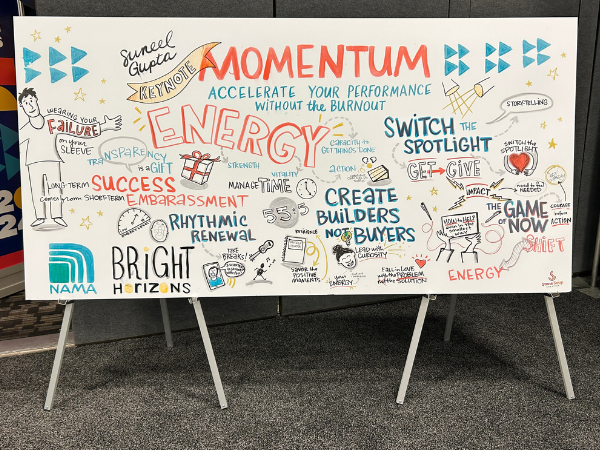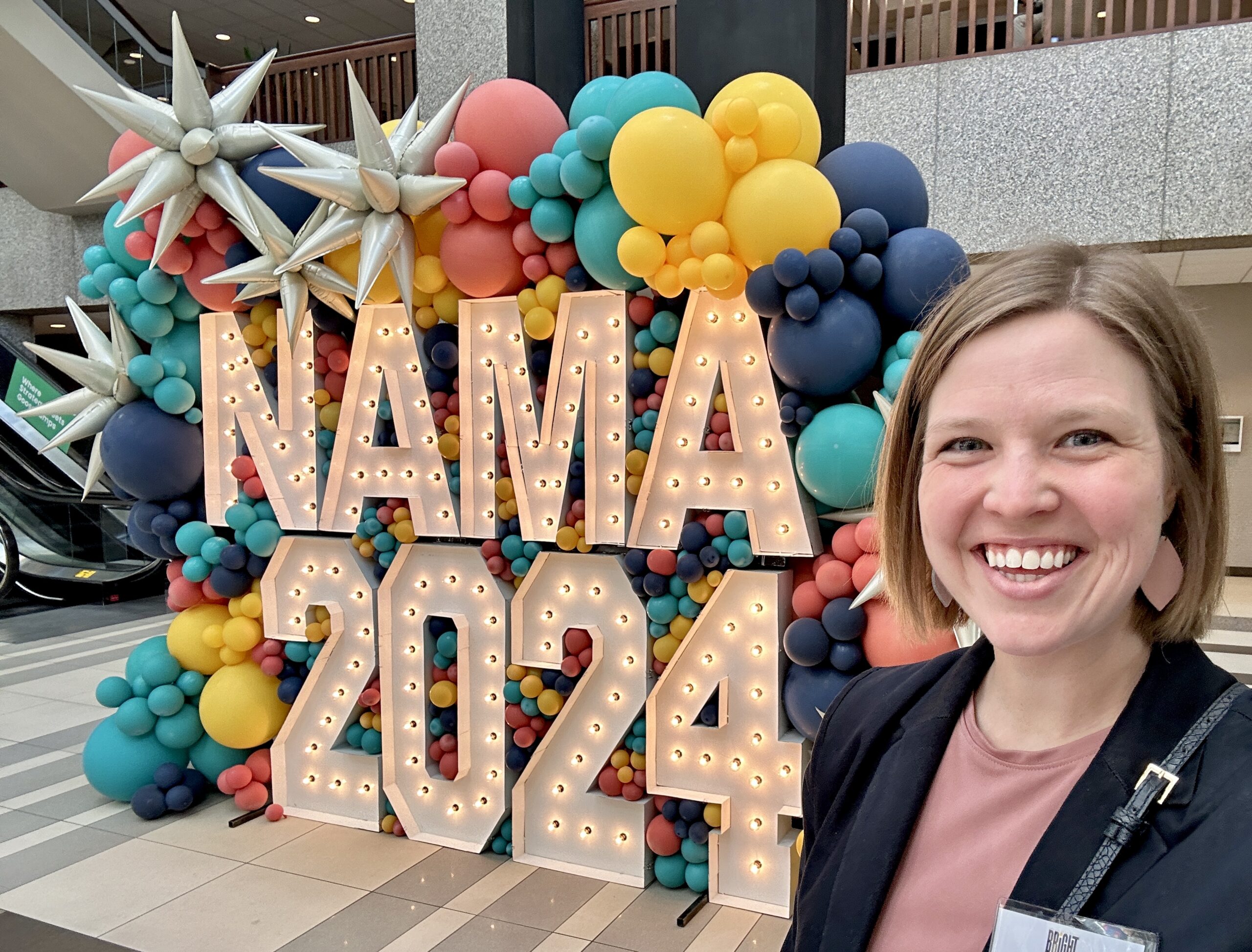Earlier this spring, I had the opportunity to attend my first National Agri-Marketing Conference. This annual event, hosted by the National Agri-Marketing Association (NAMA), spans multiple days and brought together several hundred attendees from across the nation to connect, learn and inspire. And it did just that. With pages of notes and a stack of business cards, I returned home from Kansas City feeling inspired by the people I’d met and stories that had been shared.
While there are so many nuggets I’d love to share, here, I’m highlighting seven takeaways from the conference that are applicable to businesses of any kind – not just for those in agri-marketing.
For Business Professionals
Whether you’re leading a team or in a supporting role on a team, there’s value in these takeaways for you at work (and, in general, in life!).
- Prioritize big-picture strategy first. To maximize capacity in a vase, you first have to fill the container with big rocks, then fit in the smaller ones where you can. If you start with the small ones first, there won’t be room for the big ones. This takeaway came from a fellow attendee, as she shared about a session she attended that focused on how to help small marketing departments thrive. To me, this speaks to the idea that as marketers and strategic communicators, we need to prioritize big-picture strategy first, then fill in with additional tactics where we can.

- “Play the game of now, not the game of someday.” Entrepreneur and author Suneel Gupta delivered the first keynote, and this phrase resonated: “Play the game of now, not the game of someday. Take action and let the courage catch up along the way.” While there are times when we need to have some of the building blocks in place, it’s important to remember that we don’t always have to feel ready to jump in and try.
- “Be open to the possibility that you could be wrong.” Lorinda Lewis is a business trainer with more than 25 years of experience, and in her breakout session, she shared words that also are a valuable reminder when working to operate from a curiosity mindset: “Be open to the possibility that you could be wrong.” Whether working with a peer, client, partner, intern or anyone in-between, keeping this in mind provides our brains with a unique perspective to be open to different ideas and ways of thinking – all we have to do to access this brain space is check our egos at the door.
For Storytellers
We’re all storytellers. From PR to HR and everything in between, each of us has a story to share and an audience we are trying to reach. Keep these in mind to maximize the impact of your storytelling.
- “Don’t put yourself first, put the audience first.” A reminder that feels it’s always worth noting for content creators came from a panel with four communications pros: “Don’t put yourself first, put the audience first.” While it can be easy to want to focus on all the amazing things your brand or product is doing, think like your audience. What will make them care about your brand or product? How can you enhance their life? The audience comes first when creating content and messaging.

- Keep perspective in mind. For marketing expert, professor and author Marcus Collins, who provided the second keynote, it all comes down to culture. Our perspectives, which are shaped by our cultures, create our views. “We don’t see things as they are. We see them as we are.” Collins discussed how it’s so much easier to try putting consumers in different buckets, but the reality is that culture is rooted in identity, and identity is complex. As communicators and marketers, we need to truly want to understand people and their personal identity – and their needs and experiences. We can’t just put them in a demographic box. Often, people may not change, but as brands, we can change and our perspectives can change. According to Collins, this is where magic and brand success can happen.
- Understand the human element of the story. Closing keynote speaker Alyson Van Hooser is an author, podcast host and leadership expert who spoke about how storytelling helps shape how people see us and our brands. While this may seem obvious, her perspective goes deeper: We need to understand the person and human element of a story – who we are, not just what we are. Like Collins, Van Hooser challenges us as marketers and leaders to go beyond tidy boxes and understand how to speak to audiences as people – not just demographics. This also can take some vulnerability, to share our own personal or brand stories to build trust and understanding. When we have shared understanding among our teammates, clients, partners and anyone else we work with, we can find deeper connection, better compromise and a more fulfilling way of working and living.
For Humans
We are humans, not machines. And we need to care for ourselves. Consider these tips to help care for your own wellbeing and avoid burnout.
- Practice rhythmic renewal. In addition to a plethora of inspiration, Gupta also shared that a majority of the workforce (60%) continues to languish, experiencing high stress and low energy. He recommends people practice rhythmic renewal, which can include ideas he shared such as:
- The 55/5 model. Complete 55 minutes of work and then have five minutes of rest.
- Start meetings at five past the hour. He’s found that trying to wrap them up five minutes early rarely works, but starting five minutes later offers people a chance for small rest.
- Maximize quick breaks, because transitions are key. Even if you have just 30 seconds, take a few deep breaths with your hand over your heart.
- Keep an energy journal and track little moments that are positive in your day. Paying more attention to positive moments helps make us more resilient when we inevitably face negative experiences.
Want to hear more about these insightful speakers and conversations or learn about NAMA and what the conference experience is like? Please reach out!

